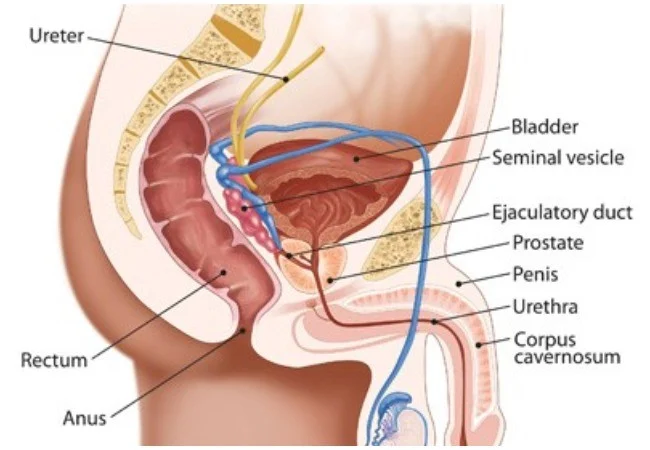Association of Medical Laboratory Scientists of Nigeria, Lagos State chapter, has raised the alarm over the increasing number of men being diagnosed with prostate disorders in the country.
Prostate disorders which are health conditions associated with men comprise Benign Prostatic Hyperplasia, prostatitis, and prostate cancer.
BPH is the most common, causing an enlarged prostate, while prostatitis is inflammation, often caused by bacterial infections.
The medical laboratory scientists disclosed that in recent times, there has been an increase in the number of men presenting with prostate disorders in health facilities.
The health professionals, who spoke at the 59th Annual Scientific Conference of AMLSN in Lagos with the theme, “Holistic approach to prostate disorders: Integrating multidisciplinary strategies for precision diagnosis”, said there was a need for increased awareness of prostate disorders for early detection.
READ ALSO: The Unforeseen Twinning of Tinubu and OBJ, By Tunde Akanni
They noted that most men with prostate cancer, which is the second leading cause of cancer deaths in men, present late to the hospital largely due to a lack of awareness about the symptoms of the disease.
Chairman of AMLSN, Lagos State branch, Abioye Omoyemi, said before prostate disorders were seen in older men but now, a lot of young men in their 40s are being diagnosed with the ailment.
The medical laboratory scientist advised men experiencing frequent urination to go for medical evaluation, stressing that frequent urination, especially at night is one of the symptoms of prostate disorders.
He described the prostate as a walnut-sized gland that is part of the male reproductive system and is located below the urinary bladder, in front of the rectum.
Omoyemi said, “In recent times, we have found out that among men, be it prostate cancer, prostatitis, and some prostate disorders have been a devil that has befallen man.
“We found out that in recent times, there is this increase in the presentation of these prostate disorders and it is beginning to be very alarming in our various hospitals. That is what stimulated our thought in terms of our theme for this year’s conference and there is a need for us to escalate this topic and create more awareness.
“In those days, it used to be very older men that came down with these disorders but these days, as young as a 40-year-old man is battling with the condition. It calls for concern.”
The laboratory scientist noted that there was a need for increased sensitisation among men for them to go for screening at least once a year on how to protect their prostate.
Harping on early detection, the senior health professional said early presentation of any disease condition including prostate disorders leads to higher chances of survival.
He identified difficulty urinating, such as trouble starting the flow of urine and the urge to urinate often, particularly at night as some of the symptoms of prostate disease.
According to research, a black man is 70 per cent more likely to develop prostate cancer than a white man and is nearly 2.3 times more likely to die from the disease.
Advising men to go for regular health screening, the medical lab scientist said, “As men increase in age, the risk of developing prostate cancer increases. It is also hereditary. If a relative has a history of prostate cancer, then there is twice the likelihood of developing the disease.
“This is why it is advisable for men aged 40 and above, to begin early screening for detection of the disease. Screening for the disease may include Prostate Specific Antigen, PSA, and other tests.”
The World Health Organisation statistics showed that more than 100,000 Nigerians are diagnosed with cancer annually and about 80,000 people lose their lives to the disease. Thus, an average of 240 Nigerians (or 10 Nigerians every hour), die of cancer daily.

The Centre for Disease Control and Prevention says different people have different symptoms of prostate cancer.
According to the CDC, some men do not have symptoms at all when they have prostate cancer, while others have symptoms such as difficulty starting urination, weak or interrupted flow of urine, and urinating often, especially at night.
Others the US health agency noted include having trouble emptying the bladder, adding that some men might experience pain or burning sensation during urination.
Delivering the keynote address, a Consultant Urologist at the Lagos University Teaching Hospital, Dr Rufus Ojewola, said a multidisciplinary approach was crucial for the effective management of prostate cancer.
He said diagnosing, treating, and managing a patient with prostate disease requires the services of more than a doctor.
According to him, the services of all branches of laboratory medicine are needed.
“It takes more than one specialist to diagnose, treat, and manage a patient with prostate disease.
The urologist explained, “Sometimes, you need to send samples to the laboratory or ask for a radiological evaluation by ultrasound and other imaging studies to get complete information so that you can treat patients properly.
“As a urologist, I ask the patients questions about symptoms and I examine them to get their signs, but of course, I will need to depend on the results of what was found in the blood, in urine, and other things.
“The summary of the conference is to raise awareness that prostate diseases are very common in our environment, hence, the need for people to submit themselves for screening.”
Ojewola identified age, race, and heredity as the major risk factors for prostate disease, but noted that there is no known cause of prostate cancer.
He added, “Prostate cancer is the most common cancer in men beyond the middle age.
“There have been some insinuations and misconceptions about prostate cancer; most people have attributed it to spiritual attack, having multiple sexual partners, and sexually transmitted diseases; but scientifically, these are not true.
“The major cause of prostatic disease is the ageing process, which causes the prostate to enlarge.
“Rracial predispositions also play a role, as prostate diseases are generally more common in black men than in men of other races. Additionally, hereditary factors are significant, as prostate diseases can run in families.”



























